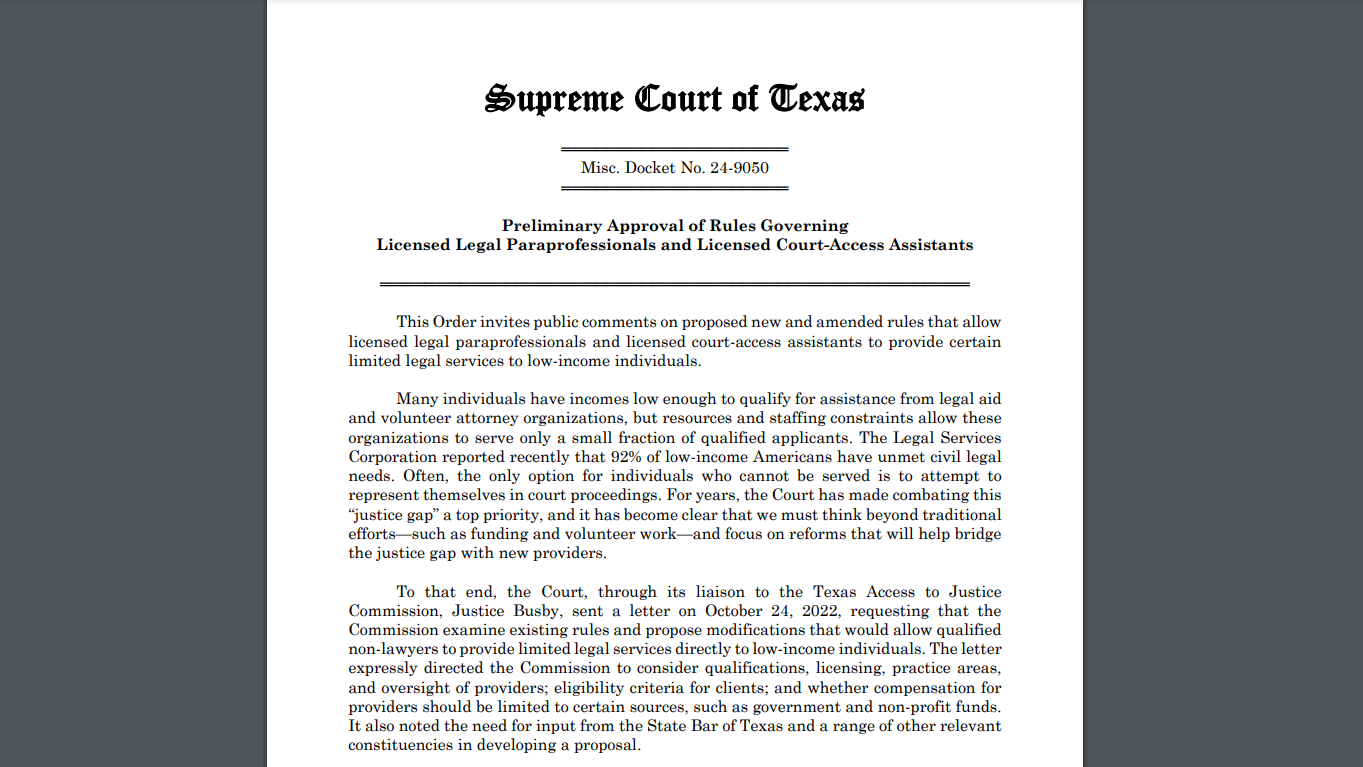The Supreme Court of Texas this week gave preliminary approval to rules that would allow the delivery of legal services in certain circumstances by licensed legal paraprofessionals and licensed court-access assistants who are not lawyers.
“For years, the Court has made combating this ‘justice gap’ a top priority, and it has become clear that we must think beyond traditional efforts — such as funding and volunteer work — and focus on reforms that will help bridge the justice gap with new providers,” the court said in its order.
The court’s order endorses the concept of licensing legal paraprofessionals and court-access assistants to provide limited legal services to low-income individuals in order to help narrow the justice gap and expand access to justice.
The order sets out proposed amendments to the State Bar Rules and the Texas Rules of Civil Procedure that would implement these licensing schemes. It is inviting public comment on the proposed amendments, to be submitted by Nov. 1, after which it will issue an order finalizing the rules.
The proposed rules were developed by the Working Group on Access to Legal Services for Low-Income Texans of the Texas Access to Justice Commission. The proposals would create two types of licensed legal services providers, legal paraprofessionals and court-access assistants.
Legal Paraprofessionals
Under the proposal, legal paraprofessionals would be permitted to provide limited legal services to low-income clients without lawyer supervision:
- In civil matters in justice courts, which are similar to small claims courts and have jurisdiction over matters where the amount in controversy is not over $20,000.
- In uncontested divorces that do not involve children or complex property issues.
- In family law matters involving uncontested suits for protection or certain uncontested suits affecting the parent-child relationship.
- In limited estate planning and probate matters, such as completing and filing forms.
- In certain aspects of consumer debt cases.
The proposed rule sets requirements for eligibility to become a legal paraprofessional and creates a process of application, examination and licensure.
The rule also sets out a code of ethics that paraprofessionals would be required to follow and sets procedures for sanctioning and disciplining paraprofessionals that are much the same as the lawyer disciplinary process.
Court-Access Assistants
In contrast to legal paraprofessionals, court-access assistants would be required to be sponsored by an approved legal assistance organization, such as a legal services organization or a law school clinic, and would have to work under a lawyer’s supervision.
These court-access assistants would be authorized to represent people in justice court, without the presence of an attorney, provided a lawyer is available to the assistant to answer any questions that may come up.
Sponsoring organizations would be required to adopt policies for lawyer supervision of its licensed court-access assistants.
For these assistants, the sponsoring legal services organization would be required to maintain their training and oversee their conduct, and to notify the State Bar of any issues in those regards.
You can learn more about this by:
- Reading the Supreme Court’s order, which includes the proposed rules.
- Visiting the website of the Access to Legal Services Working Group.
- Reading the working group’s full report and recommendations to the Supreme Court.
 Robert Ambrogi Blog
Robert Ambrogi Blog